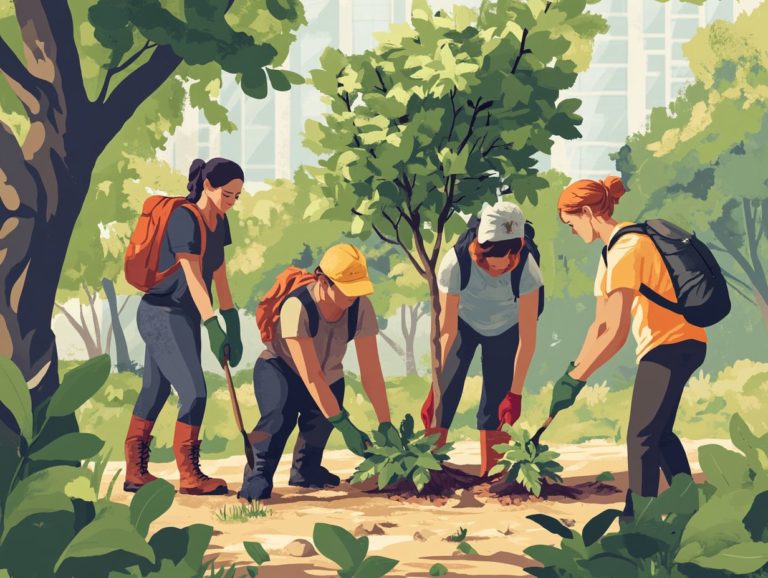Tips for Sustainable Travel in Urban Areas
Sustainable travel is more than just a trend. It s an important way to explore cities while reducing harm to the environment.
As cities expand, the necessity for responsible travel practices becomes increasingly paramount.
This article explores the benefits of sustainable travel. It also highlights challenges in urban areas and shares practical tips to enhance your travel experience.
From exploring transportation alternatives to actionable insights for travelers, you’ll uncover how embracing sustainability can strengthen local communities and catalyze meaningful change.
Contents
Key Takeaways:
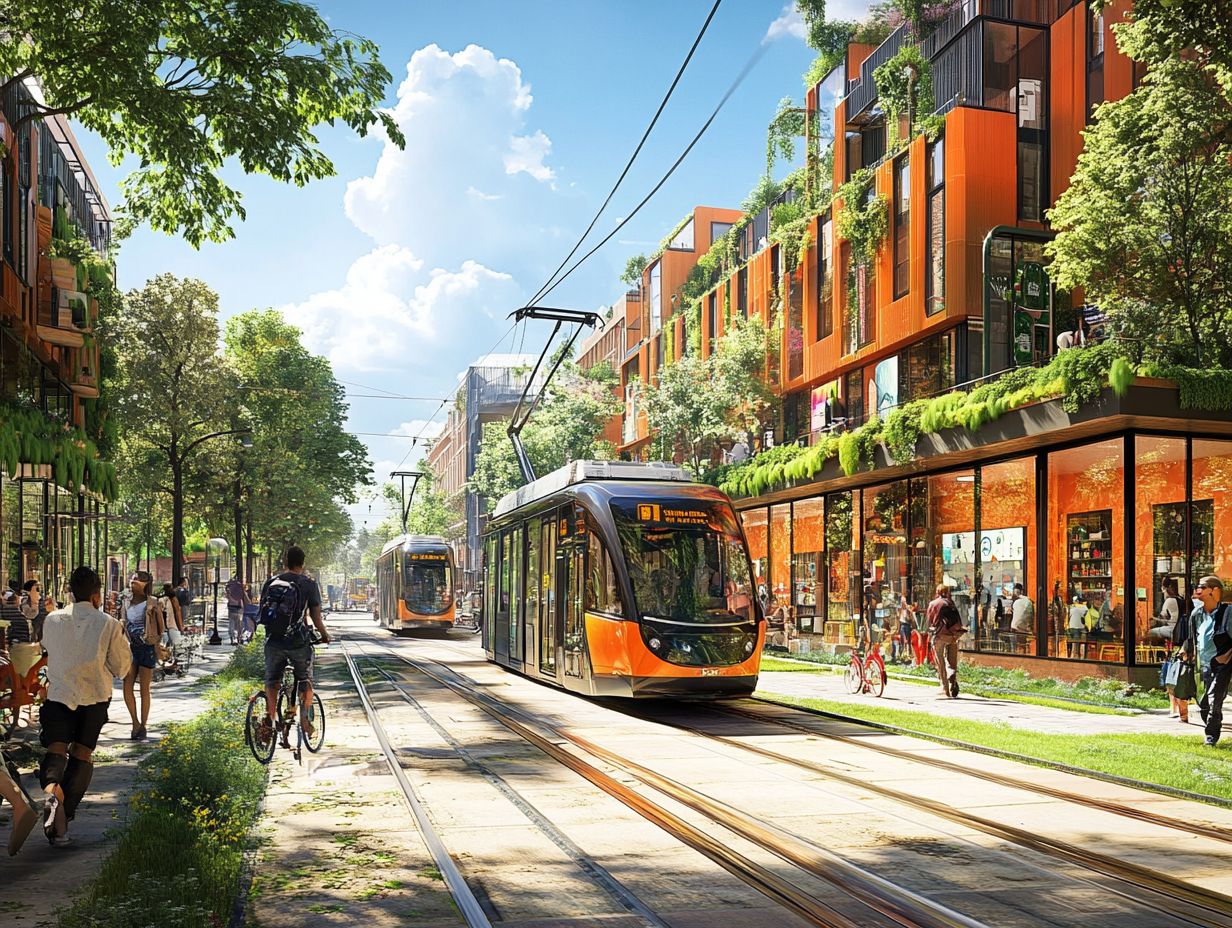
- Consider alternative modes of transportation, like walking or biking.
- Plan wisely to make your travel sustainable.
- Support local businesses by choosing eco-friendly places to stay.
Defining Sustainable Travel
Sustainable travel, often referred to as responsible tourism, is an approach that enables you to minimize your environmental impact while enhancing the cultural heritage and economic wellbeing of local communities. It encourages you to seek out eco-friendly accommodations, reduce carbon emissions, and adopt practices such as waste reduction and using refillable bottles.
By embracing slow travel principles, you can engage more deeply with indigenous wildlife and local food systems, fostering a richer understanding of the regions you explore.
This philosophy not only safeguards natural landscapes but also supports local artisans and businesses by directing resources where they matter most. For instance, eco-friendly lodges often prioritize sourcing materials locally and hiring local staff, which creates jobs and helps preserve traditional crafts.
By joining programs that offset carbon emissions, you can help balance the pollution you create. These programs often fund projects like planting trees and developing renewable energy sources. These efforts not only help mitigate greenhouse gas emissions but also play a vital role in regenerating ecosystems.
By making mindful travel choices, you can actively contribute to the preservation of biodiversity while enjoying more enriching and authentic experiences along the way.
Benefits of Sustainable Travel in Urban Areas
Sustainable travel in urban areas offers a wealth of benefits that go well beyond the typical tourist experience. It cultivates a richer connection between you and the local communities, all while significantly minimizing the environmental impact typically linked to conventional tourism.
By opting for public transportation and supporting low-waste initiatives, you not only contribute to the well-being of urban ecosystems but also enrich cultural exchanges in the vibrant tapestry of city life.
Environmental and Social Impact
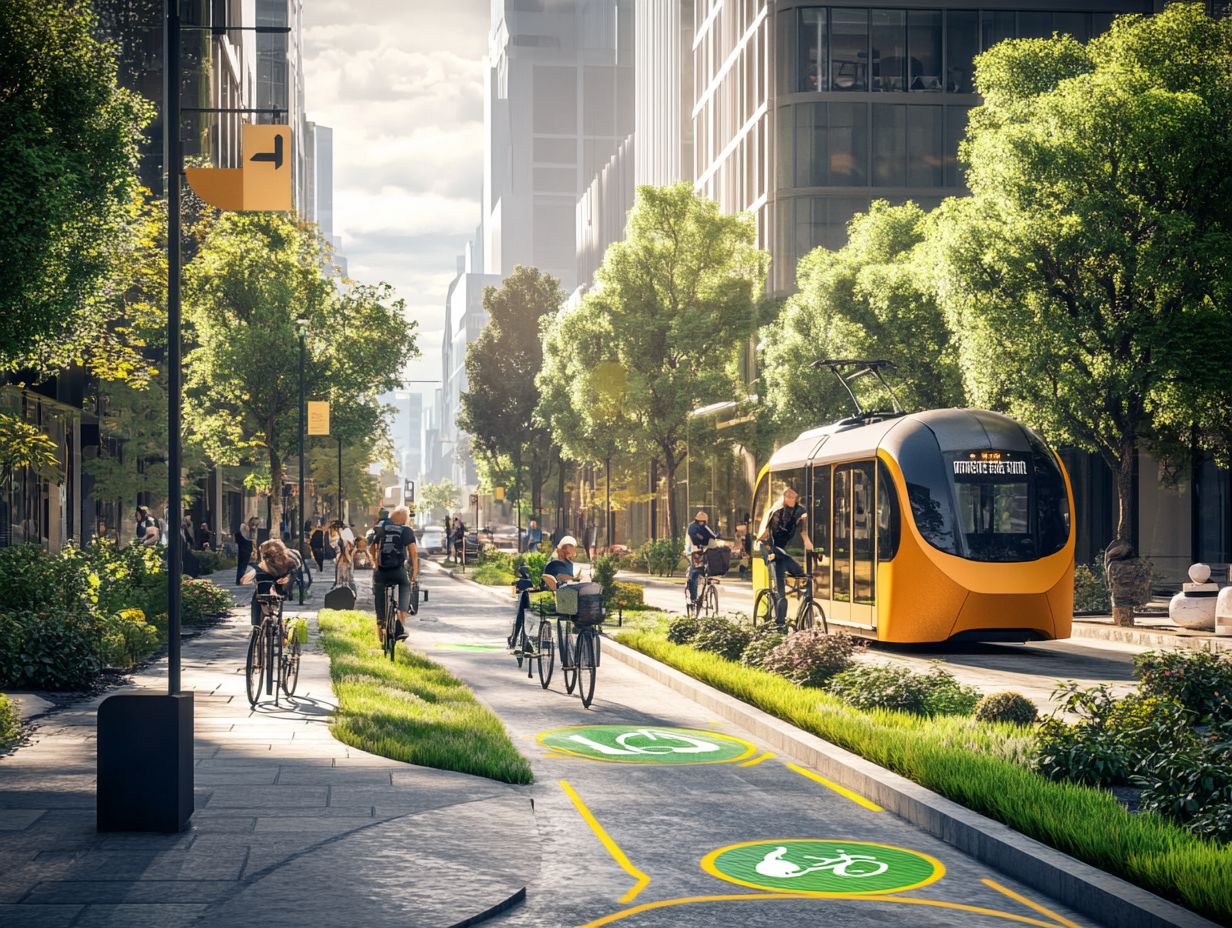
The environmental and social impact of sustainable travel can truly be profound, offering significant benefits to local communities and the ecosystems they inhabit. By choosing eco-friendly options and supporting local businesses, you play a crucial role in mitigating pollution and nurturing a tourism model that prioritizes community involvement and environmental conservation.
When you opt for accommodations that utilize renewable energy sources, like solar or wind power, you not only reduce your carbon footprint but also champion energy sustainability. In regions where eco-lodges flourish, you ll often find that local wildlife benefits from habitat preservation, as these lodges strive to coexist with nature rather than exploit it.
Engaging in socially responsible tourism initiatives can breathe new life into local economies by creating job opportunities and fostering cultural exchange, which revitalizes traditions and local crafts. By minimizing waste through eco-packaging and responsible food sourcing, you contribute to reducing landfill contributions, ultimately enhancing community well-being while deepening your connection to the destinations you visit.
Challenges of Sustainable Travel in Urban Areas
Despite the increasing recognition of sustainable travel’s significance, urban areas encounter various challenges that impede its widespread adoption. This is especially true in dense urban regions where traffic and infrastructure-related carbon emissions can be substantial.
Issues like insufficient public transportation systems and a scarcity of resources for eco-friendly initiatives frequently stand in the way of achieving a more sustainable tourism model.
Obstacles to Implementation
The challenges of implementing sustainable tourism practices in urban areas are complex and multifaceted. You may encounter economic barriers that local businesses face.
Additionally, a lack of sufficient government incentives for energy-saving initiatives can create a gap between the desire to adopt sustainable practices and the practical realities of urban tourism development.
Regulatory hurdles can stifle innovation. Stringent permits and compliance requirements often deter smaller enterprises from investing in sustainable technologies.
For example, local artisans aiming to create eco-friendly souvenirs might struggle due to limited access to financial support or training.
Fostering collaborative efforts between local governments and businesses can help communities develop programs that provide:
- Grants
- Training sessions
- Tax incentives
When local enterprises are enabled to pursue green initiatives, such as sustainably sourcing materials or utilizing renewable energy, they contribute to environmental wellness.
They also enhance their attractiveness to conscious travelers seeking authentic experiences.
Strategies for Sustainable Travel in Urban Areas
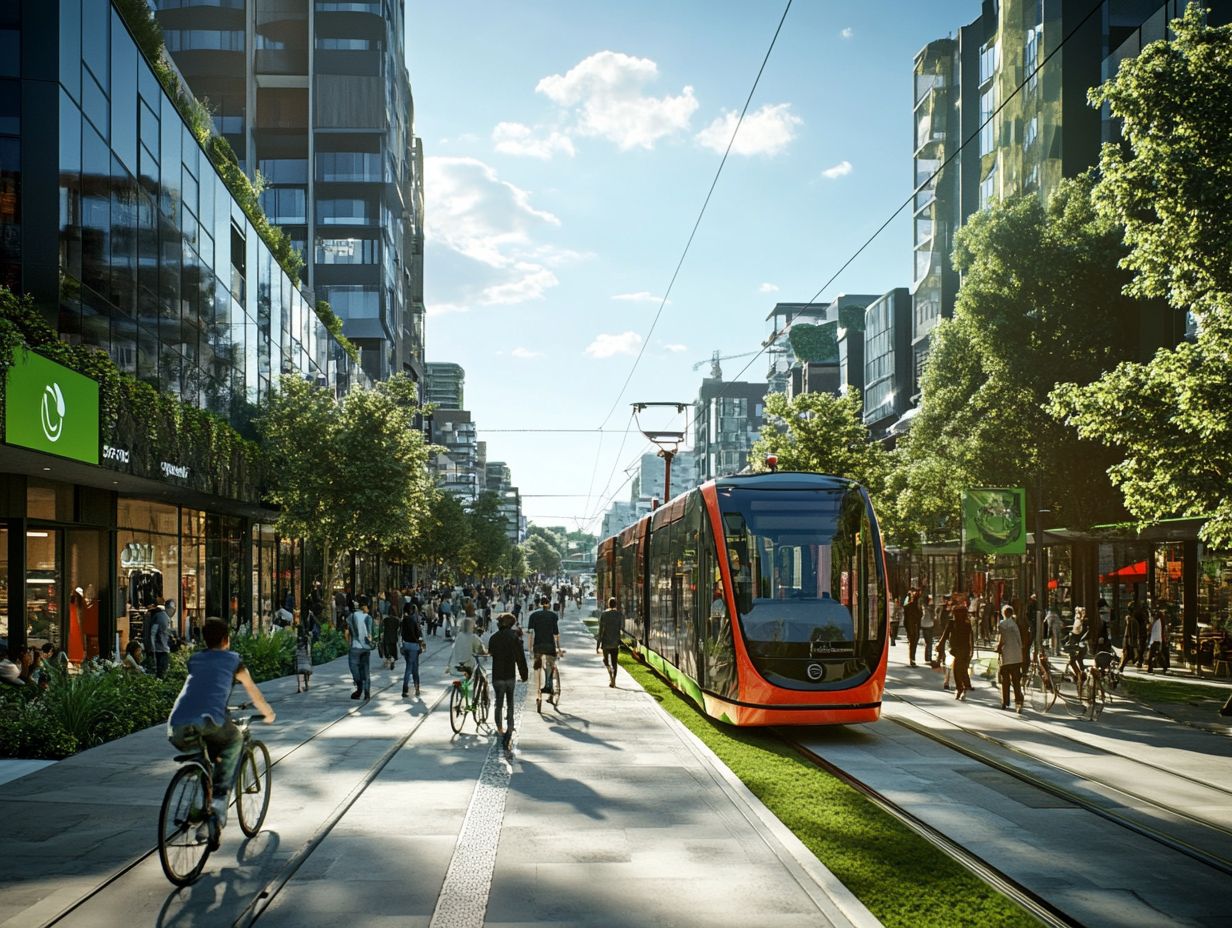
Implementing effective strategies for sustainable travel in urban areas demands a thoughtful plan that engages a diverse array of stakeholders. This includes travelers, local businesses, and government entities.
By championing sustainable hotels, incentivizing public transportation usage, and encouraging initiatives like low waste practices and carbon offsets, cities can create a vibrant bond between travelers and the urban ecosystem.
This collaborative effort not only enhances the travel experience but also respects the unique character of each urban environment.
Transportation Options and Alternatives
Transportation options play a pivotal role in sustainable travel, especially in urban settings. Public transportation systems provide green options to traditional car travel.
By opting for buses, trains, or even bicycles, you can significantly reduce carbon emissions and elevate your overall travel experience.
Not only are you lessening your environmental footprint, but you re also engaging with local communities in a more authentic way.
Embracing these sustainable methods benefits you as an individual traveler while contributing to the larger mission of easing traffic congestion and promoting cleaner air.
Urban bike-sharing programs and pedestrian-friendly walkways invite exploration. They make it easier for you to uncover hidden gems throughout the city.
Well-designed public transit systems efficiently connect various neighborhoods, fostering a sense of community and ensuring equal access to resources.
Ultimately, by choosing these transportation options, you re not just creating a healthier environment for yourself but enhancing urban living for everyone around you.
Efficient Planning and Resource Management
Efficient planning and resource management are crucial for sustainable travel, especially in urban areas. These areas aim to take care of the environment while welcoming tourists.
By using energy-saving technologies, championing local food, and choosing sustainable hotels, cities can boost eco-friendly tourism. Following top sustainable travel practices enhances your travel experience and benefits local communities by generating jobs and preserving regional cuisine.
Choosing farm-to-table restaurants or exploring local markets helps support a vibrant local economy. Utilizing renewable energy sources in hotels and attractions reduces carbon emissions, making your travel experience even more sustainable.
Focusing on conservation, cities can offer unforgettable adventures for travelers like you.
Tips for Sustainable Travel in Urban Areas
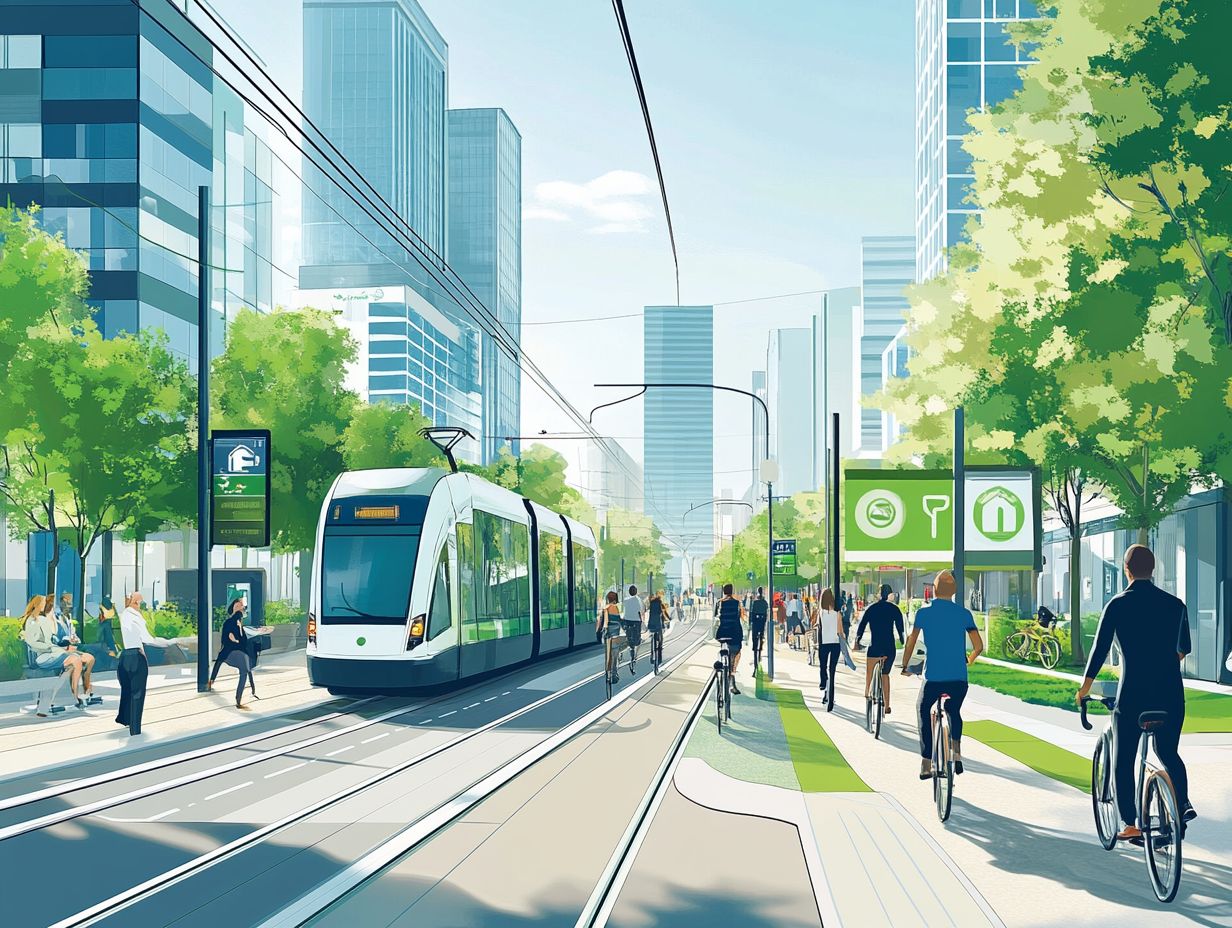
If you’re looking to make a meaningful impact while exploring urban landscapes, sustainable travel practices are a must. Choose eco-friendly accommodations and connect with local communities to create a responsible travel experience.
Your thoughtful choices will enrich your journey. Immerse yourself in the essence of each destination while contributing positively to the places you visit.
Practical Advice for Travelers
Simple yet impactful practices can make a big difference in sustainable travel. Use refillable bottles, opt for low-waste alternatives, and support eco-friendly businesses. Small changes lead to a significant reduction in the environmental footprint of urban tourism.
By choosing biodegradable toiletries and reusable bags, you minimize waste while exploring. Dining at farm-to-table restaurants captures the region s culinary essence and supports sustainable practices that benefit the local economy.
Engaging with local artisans preserves cultural heritage and reduces the carbon emissions associated with mass-produced souvenirs. By adopting these mindful habits, you enhance your travel experience and contribute to a healthier planet.
Impact of Sustainable Travel on Local Communities
Sustainable travel significantly benefits local communities. It brings economic advantages and nurtures cultural exchange.
By prioritizing local businesses and embracing sustainable practices, you create meaningful connections that enrich both your experience and the lives of the residents you meet.
Building Stronger Communities through Sustainable Travel
Sustainable travel builds strong connections between you and local businesses while preserving cultural heritage and supporting environmental health. This relationship enriches your travel experience and promotes a sustainable future for urban areas.
When you shop at local markets, eat at neighborhood restaurants, or join community-led tours, you’re putting money into the local economy. This helps small business owners thrive and encourages the preservation of unique traditions that might otherwise fade away.
Using sustainable travel practices, like reducing waste and choosing eco-friendly transportation, protects the natural beauty of these vibrant cultures. This collaboration fosters a richer experience for you as a traveler and improves the well-being of local communities.
Frequently Asked Questions
What are some tips for sustainable travel in urban areas?
- Use public transportation like buses, trains, or subways instead of driving.
- Walk or bike whenever possible to lower carbon emissions and stay active.
- Choose eco-friendly accommodations that practice sustainability.
- Support local businesses to reduce your transportation carbon footprint.
- Use reusable water bottles and bags to cut down on waste.
- Look for sustainable tours, such as walking or biking adventures.

